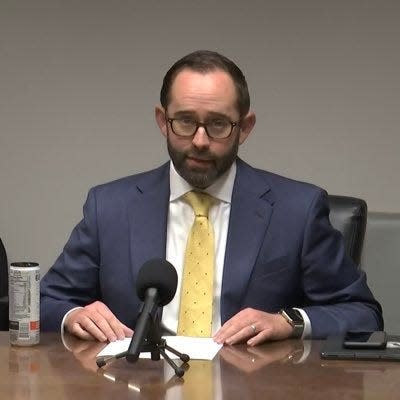Florida abortion amendment: More babies, more revenue is one argument at fiscal impact meeting
- Oops!Something went wrong.Please try again later.
The battle over abortion entered a meeting of an otherwise obscure state panel on Monday, turning in part into a discussion about how many babies born or aborted would save or cost Florida taxpayers.
And the attendance of a top aide to Gov. Ron DeSantis telegraphed that the administration is all in against Amendment 4, the November ballot measure aimed at ensuring abortion access in the state.
Chris Spencer, once DeSantis' budget chief and now head of the State Board of Administration, told other panelists on the state's Financial Impact Estimating Conference that the abortion amendment would have a negative fiscal impact on Florida. The group met in the Knott Building, part of the Florida Capitol Complex.

A "fiscal impact statement," to be printed on ballots, could potentially sway voters to keep Florida's Heartbeat Protection Act, a ban on abortions after six weeks, in effect.
Spencer, who doesn't usually attend the conference's meetings, said a decrease in births would affect state revenue in the long term because of a decrease in population growth.
"If an individual life was costlier than it contributed, you would see at least a slow down in revenue growth," in the state, Spencer said, arguing revenues have increased as the state's population has increased.
Amendment 4, which needs at least 60% of the vote to pass, would negate the current restrictions signed into law by DeSantis. The ballot measure would allow abortions up to fetal viability, usually about 24 weeks of pregnancy.
That would restore a standard in place across the nation until the U.S. Supreme Court's 2022 Dobbs ruling that ended the constitutional right to abortion.
Recent data shows people continue to get abortions even after state abortion bans are enacted, according to the Guttmacher Institute, a nonprofit research organization that supports abortion rights. Data from 2023 for the year after the U.S. Supreme Court's decision in Dobbs v. Jackson Women's Health Organization shows the U.S. actually saw an 11% increase in abortions compared to 2020.
Amy Baker, coordinator for the Florida Legislature's Office of Economic & Demographic Research, said growth depends on which population increases, that there's a difference between a Baby Boomer who moves to South Florida and a newborn baby.
'Purely a financial discussion,' state economist says
But she reminded the public: "This is purely a financial discussion. Nobody at this table is saying life is intrinsically valuable or not. But in terms of services to the state, or revenues to the state, that's all we're referencing."
Spencer ultimately said he thought the fiscal impact should be considered "indeterminate" on the ballot, but also argued, for instance, that potential litigation over the amendment will cost the state.
EDR's assessment on the ballot measure was also "indeterminate," as analysts do not usually include litigation in the fiscal impact.
But Spencer and Amendment 4 opponents who spoke at the meeting, including a representative from the attorney general's office, argued court costs could be in the millions for decades.
Jason Gonzalez, a name partner of Tallahassee's Lawson Huck Gonzalez law firm speaking on behalf of the Susan B. Anthony Pro-Life America group, said outside counsel costs could total $3 to $5 million for 20, even 30 years.
'Much more litigation than medical marijuana amendment,' lawyer says
"I can say, from my experience, this amendment if passed will cause much more litigation than the medical marijuana amendment," Gonzalez said. "That will happen times probably ten."
There were no speakers in favor of the amendment except for the ACLU, which was representing the sponsors of the amendment. Michelle Marra Morton said there would be no fiscal impact if the ballot measure were passed and said future litigation is out of bounds in the consideration of the fiscal impact statement.
This is the second time EDR has had to create a fiscal impact statement for Amendment 4.
Originally finalized last year, the statement must now account for the state's new six-week ban after abortion rights proponents argued and won in court that tighter abortion restrictions would cost the state more money. The original fiscal impact statement was "indeterminate."
Both House Speaker Paul Renner and Senate President Kathleen Passidomo decided to reconvene the committee after the six-week ban was upheld. The panel will meet again July 8 to make the fiscal impact statement final.
Ana Goñi-Lessan, state watchdog reporter for the USA TODAY Network – Florida, can be reached at agonilessan@gannett.com.
This article originally appeared on Tallahassee Democrat: Florida Amendment 4: Panel talks fiscal impact of babies born, aborted
